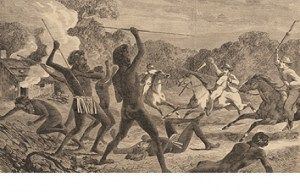Another time to reflect & take action on how the Australian narrative continues to neglect & ignore the wars that were fought against Aboriginals on the island of Australia by invading settlers and colonists. On 2017-04-24 for a second round, ASF Perth will be at King’s Park to remember & talk with those interested in The Frontier Wars.
Anzac Day is supposed to be a national day of remembrance in Australia and New Zealand that broadly commemorates all Australians and New Zealanders who served and died in all wars, conflicts, and peacekeeping operations and the contribution and suffering of all those who have served (“ANZAC Day”, Australian War Memorial). However in reality this remembrance is conveniently selective, as the first wars in Australia, the Frontier Wars, has no official recognition of occurring.
What is the Frontier Wars?
For most of the 20th century, Australians were taught about the peaceful settlement of Australia, featuring stories of pioneer grit and endurance. As a result of these narratives, the vigour of Aboriginal resistance was forgotten(Reynolds, H. 2013, Forgotten War, NewSouth Publishing, Sydney, pg.32). In recent decades, however, many historians have exposed the narrative of peaceful colonisation as a myth, using first-hand accounts, newspaper articles and diaries to reveal the tragically violent and bloody nature of Australia’s settlement.
Massacres
In the beginning, Aboriginal people often met the newcomers with hospitality and generosity. However, as it became evident that the settlers were here to stay, and as Indigenous people were dispossessed of more and more of their lands, denied access to traditional food and water sources, and subject to sexual abuse and slavery at the hands of the colonists, attitudes began to change and conflict was inevitable(Behrendt, L. 2012, Indigenous Australia for Dummies, Wiley Publishing Australia PTY LTD, Milton, Australia, pg.251).
Although controversial, the most common estimates of fatalities in the fighting are at least 20,000 Indigenous Australians and between 2,000 and 2,500 Europeans. Historical records document numerous occasions on which Indigenous people were hunted and brutally murdered by the colonists. Massacres of Indigenous people often took the form of mass shootings or driving groups of people off cliffs. There are also accounts of colonists offering Indigenous people food laced with arsenic and other poisons (Evans, Raymond (2007), A History of Queensland. Cambridge University Press, p. 54).
Massacres were executed in operations by the colonial para-military forces (Peacock, Matt (26 February 2009). “War memorial battle over frontier conflict recognition”. The 7:30 Report [Australian Broadcasting Corporation]. Archived from the original on 26 May 2009), and civilian colonists were rarely punished for the atrocities committed against Indigenous people, with authorities in many instances endorsing the slaughter. The Myall Creek Massacre on the 10th June 1838 was one exception though; seven white settlers were tried and hanged for the murder of 28 Indigenous people (mostly women, children and the elderly).
Indigenous Resistance
It is important to emphasise, as although the colonists eventually prevailed, Aboriginal people around Australia resisted incursions onto the land, often tenaciously, with violent and tragic outcomes (Behrendt, L. 2012, Indigenous Australia for Dummies, Wiley Publishing Australia PTY LTD, Milton, Australia, pg.202). Indigenous Australians didn’t passively accept the invasion of their land, resisting vigorously, and sometimes violently. It was not only their physical survival that was threatened; their cultural and spiritual survival was also at stake as sacred sites were desecrated and connection to country disrupted. In response, they sometimes employed guerrilla tactics, including raiding farms, killing stock, burning buildings, and even killing settlers.
How should we celebrate Anzac day?
What does Anzac day mean to you?
Should we remember all of those who were either killed, injured, raped or exposed to the psychological trauma of war, including Anzac soldiers, opposition soldiers, civilians and refugees?
Should we classify state violence into specific categories and selectively choose what shall and shall not be commemorated?
Should we allow politicians to use the day as an opportunity to promote Australian nationalism to overwhelm the public with feelings of prestige, identity and self-esteem through this national identification, and expect loyalty and commitment to fight in return?
The Anarcho-Syndicalist Federation Perth is calling for:
• An immediate recognition of the Frontier Wars;
• Memorials for all massacres and battles;
• Efforts to find the bodies of all fallen indigenous soldiers so they can be buried according to their local customs; and
• Immediate commencement of efforts to change the historical narrative to reflect a balanced account of Australian colonisation.
